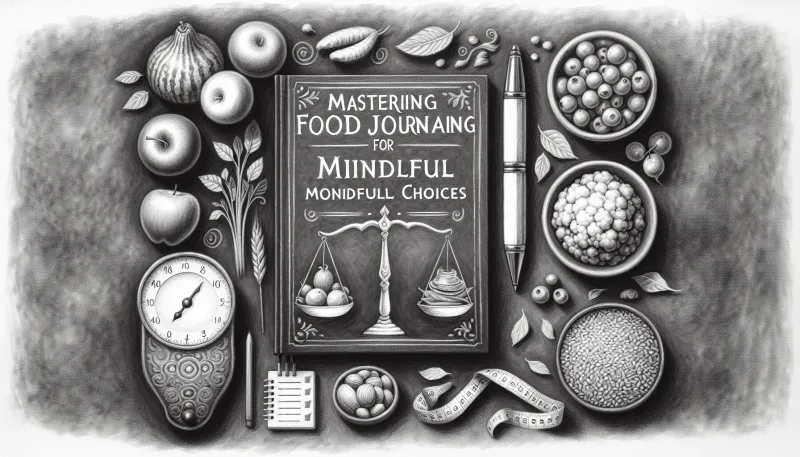Mastering Food Journaling for Mindful Choices: A Comprehensive Guide

Learn how to use food journaling for mindful choices with our comprehensive guide. Understand the benefits, techniques, and tips for effective food journaling.
Eating consciously is crucial for maintaining a balanced diet and a healthy lifestyle. But in a world full of distractions, it's challenging to keep track of what we consume. Enter the practice of food journaling—a powerful tool to foster mindful eating habits. This guide delves into the ins and outs of food journaling and how it can lead to better food choices.
What is Food Journaling?
Food journaling is the practice of recording everything you eat and drink throughout the day. This mindful activity involves noting down the type of food, portion size, time of consumption, and sometimes even the contextual mood or feelings associated with eating. It's a straightforward yet potent method to increase self-awareness regarding your eating patterns.
The Benefits of Food Journaling for Mindful Choices
Counting calories and macro-nutrients can seem tedious, but the benefits of maintaining a food journal are manifold.
Increased Self-Awareness
By tracking consumption, individuals become more conscious of their eating patterns. This heightened awareness can pinpoint unhealthy habits and pave the way for positive changes—a crucial step in the journey towards mindful eating.
Identifying Food Sensitivities
A food journal can help reveal correlations between specific foods and symptoms such as bloating, migraines, or fatigue. Identifying these sensitivities can significantly improve overall well-being.
Accountability and Motivation
Writing down what you eat creates a sense of accountability. Knowing you have to log a meal might make you think twice about opting for unhealthy options. Additionally, seeing your progress documented can be highly motivating.
Supporting Weight Management
For those aiming to lose or maintain weight, food journaling helps in understanding whether you're consuming more or fewer calories than needed. This can be instrumental in designing an effective diet plan.
How to Start Food Journaling for Mindful Choices
Getting started is easier than you think. Follow these straightforward steps:
Choose Your Medium
Decide whether you prefer a physical notebook, a digital app, or an online spreadsheet. Each medium has its pros and cons; choose the one that aligns with your lifestyle.
Set Clear Goals
Define why you're maintaining a food journal. Whether it's for weight loss, managing a medical condition, or simply cultivating mindfulness, having clear aims will guide your journaling practice.
Be Consistent
Consistency is crucial. Make it a habit to note down every meal, snack, and drink. The more detailed you are, the more insightful your journal will be.
Note Emotional Triggers
Document your emotions along with your dietary intake. Understanding how stress, boredom, or happiness influences your choices can be an eye-opener.
Tips for Effective Food Journaling
Here are some expert tips to maximize the benefits of your food journal:
Include Portion Sizes
Estimating and noting portion sizes provide a clearer picture of what and how much you're consuming. This aids in understanding serving amounts and improving portion control.
Be Honest
Record everything, even if it's a small candy or a handful of chips. Honesty in your journaling fosters greater self-awareness and leads to more accurate insights.
Review Regularly
Make it a practice to review your food journal regularly. Weekly reviews can help identify trends and patterns that you might miss on a day-to-day basis.
Seek Professional Guidance
Consulting a nutritionist can provide additional insights into your food habits. Experts can help you interpret your journal and create a plan tailored to your needs.
Overcoming Common Challenges in Food Journaling
While the benefits are substantial, some challenges can arise. Here's how to tackle them:
Time Constraints
Maintaining a detailed journal can be time-consuming. Simplify by using apps that allow quick logging and offer features like barcode scanning for packaged foods.
Lack of Motivation
Staying motivated can be tough. Set reminders, join online communities, or find a journaling partner to keep the momentum going.
Feeling Overwhelmed
Start simple. Begin by documenting just your main meals and gradually include snacks and beverages. Any progress is good progress.
Conclusion
Food journaling is a transformative practice that aids in making mindful dietary choices. By increasing self-awareness, identifying food sensitivities, and fostering accountability, it creates a solid foundation for a healthier lifestyle. Whether you're aiming to lose weight, manage a medical condition, or simply eat more mindfully, maintaining a food journal can be a powerful step towards achieving those goals.
Embark on your food journaling journey today and experience the positive impact it can have on your eating habits and overall well-being.



























